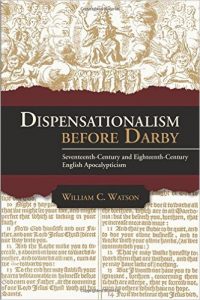
Author: Watson, William C.
Genre: Theology - Dispensationalism
Tags: Doctrine / Theology, Eschatology
Series:
Rick Shrader‘s Review:
The title of this book invites you to read it. The common complaint about dispensationalism is that it began 150 years ago with John Nelson Darby. Watson gives abundant historical fact to the contrary. William Watson is Professor of History at Colorado Christian University. He received his B.A. in History from California State Polytechnic University, his M.Div. from Talbot School of Theology, and an M.A. and Ph.D. in British history from the University of California, Riverside. He is well qualified to speak on this issue.
The book is filled with original source material. Watson explains, “The method I followed in this work was to spend four years studying only primary sources before reading the historians and theologians. This was made possible by using the search engines of Early English Books Online (EEBO) and the Eighteenth-Century Short Title Catalogue (EST/ECCO). Only later did I check my conclusions with that of other writers, historians, and theologians” (p. vii-viii). Also, “It is my intent to show that the ideas of dispensationalism and Christian Zionism (known at the time as Restorationism) existed in the seventeenth and eighteenth centuries, long before John Nelson Darby who is considered the father of modern dispensationalism and Theodore Herzl (the father of modern Zionism) articulated them. The ideas espoused by Darby were present in earlier British theology dating to English Puritanism long before Darby set them within a framework that subsequently arose as a system in the 1800s” (p. 2). In addition, “In the late eighteenth century, more than a generation before Darby, belief in a rapture of the Church before a great tribulation was commonplace in Britain. The belief was held not only by Baptists like Killingsworth but also by leading Anglicans like Hort, Broughton, and Hardy, and even by Scottish Presbyterians like Fraser” (p. 262).
Watson’s documentation of the original writings is thorough enough to become tedious. At the end of many chapters are charts including names, subjects, and dates showing premillennialism, rapture doctrine, and dispensational teaching long before Darby. “Very little of what John Nelson Darby wrote in the 19th century was new” (p. 339).
